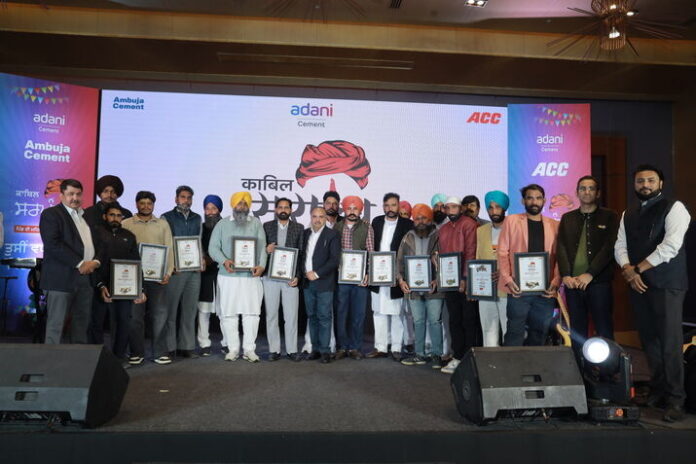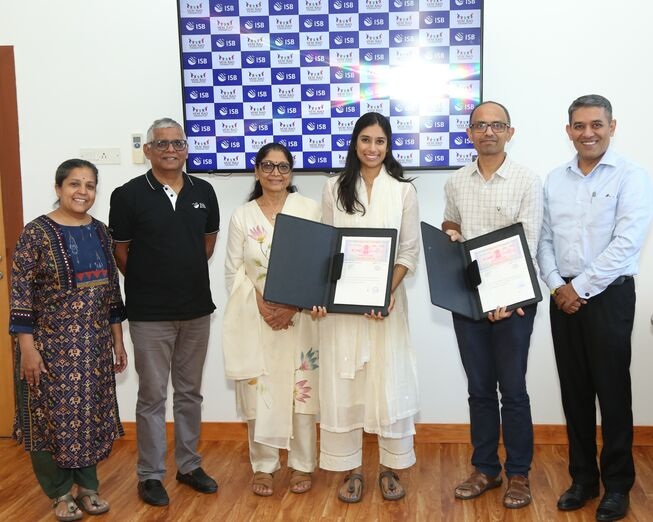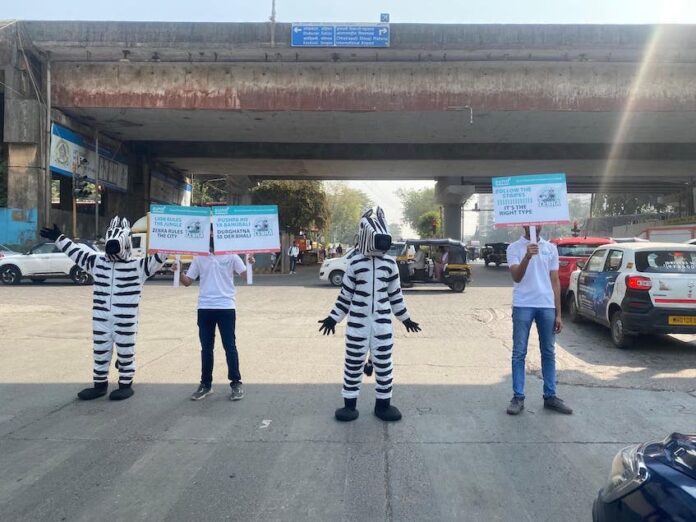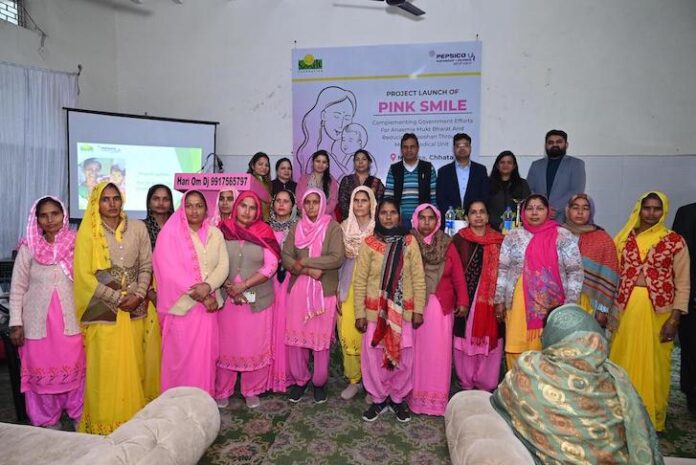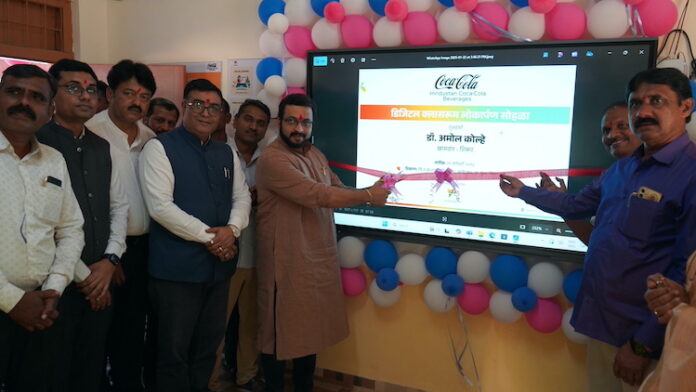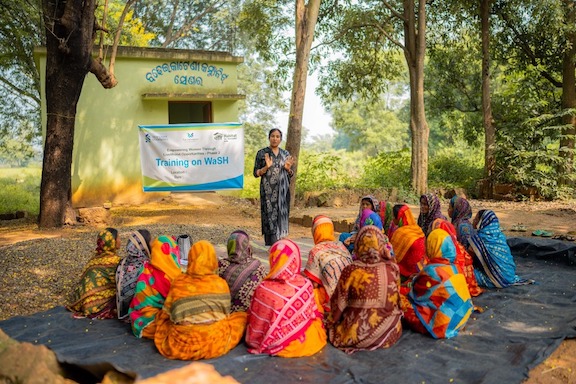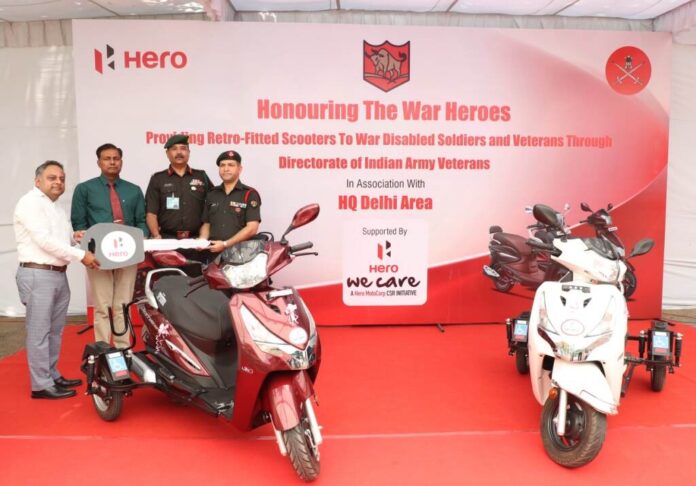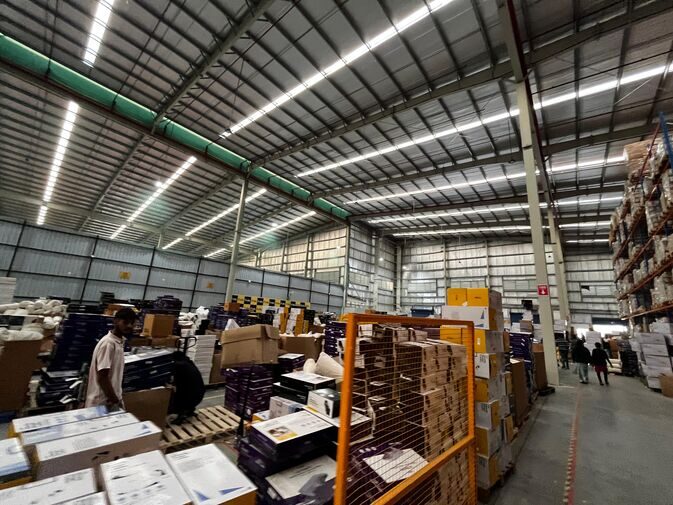CSR News: Grassroots leadership in Punjab with ‘Kaabil Sarpanch’ initiative
Ambuja Cements and ACC, the cement and building material companies of the diversified Adani Portfolio, have taken a key step in empowering rural leadership through the ‘Kaabil Sarpanch’ initiative. In partnership with MyFM, the programme celebrates the exceptional leadership of village sarpanches who work tirelessly to transform their communities across Punjab. This initiative aligns with Ambuja Cements’ and ACC’s vision for an empowered and progressive rural India.
The initiative reached 50 villages across Bathinda, Sangrur, Mansa, and Barnala districts, evaluating parameters like infrastructure, cleanliness, essential services, and community happiness. Among these, 13 sarpanches stood out for their exceptional leadership. Their efforts included initiatives to improve village amenities, promote health awareness, and foster unity.
Ambuja Cements and ACC engaged directly with these villages through activities designed to promote sustainable living and health, including a ‘nukkad natak’ (street play) addressing substance abuse, fostering stronger community bonds in the process.
In one inspiring example, a Sarpanch from Sangrur spearheaded a waste management project, ensuring a cleaner environment and healthier lives for residents. Such stories underscore the transformative power of grassroots leadership. The initiative concluded with a grand felicitation ceremony in Amritsar, where the selected sarpanches were honoured for their transformative contributions.
Through initiatives such as ‘Kaabil Sarpanch,’ Ambuja Cements and ACC reaffirm their commitment to strengthening rural India by recognising and nurturing its leaders. The Companies envision a future where every village is empowered to thrive and contribute to the nation’s progress.
Disclaimer: This media release is auto-generated. The CSR Journal is not responsible for the content.
CSR News: Tech for Social Good Challenge to drive futuristic models for social change
The Indian School of Business (ISB) and the Veni Rao Foundation have partnered to launch the annual ‘Veni Rao Tech for Social Good Challenge’, an initiative aimed at sparking innovative solutions to pressing social challenges. Enabled by a generous endowment of ₹ 1 Crore by the foundation, the challenge will be hosted annually by ISB, drawing on its academic expertise to discover and support solutions with meaningful, scalable impact.
The initial focus of the challenge is on digital health innovations, with ISB’s Max Institute of Healthcare Management (MIHM) spearheading this phase. The two organisations will foster ideas that leverage emerging technologies to address critical healthcare issues.
Building on the Veni Rao Foundation’s legacy of impactful healthcare initiatives—including surgical facilities and mobile health clinics across Telangana, Andhra Pradesh, and Karnataka— the challenge will act as a platform for professionals, startups, and students to develop scalable solutions for underserved communities.
Ratna Reddy, Founder-Trustee of the Veni Rao Foundation and Founder of CHIREC International School emphasised the shared vision: “This partnership reflects our commitment to driving social impact through innovation. By engaging diverse stakeholders, the annual challenge will accelerate the development of practical solutions that improve lives in underserved communities.”
Professor Sarang Deo, Deputy Dean, Faculty & Research and Executive Director, Max Institute of Healthcare Management, ISB, highlighted the partnership’s significance: “There is a growing need to direct cross-functional teams to optimise the latest and emerging digital technologies in addressing pressing healthcare challenges. We are sure our partnership with the Veni Rao Foundation would go a long way in validating the innovations and measuring their impact on clinical and non-clinical outcomes.”
Disclaimer: This media release is auto-generated. The CSR Journal is not responsible for the content.
CSR News: CSR brings road safety to life with its ‘Talking Zebra’ campaign
Zuno General Insurance, formerly known as Edelweiss General Insurance, a new-age digital insurer, has launched a unique road safety awareness initiative, ‘The Talking Zebra’ to educate motorists and pedestrians about the importance of following traffic rules in an engaging and memorable way.
This initiative, spanning from 16th Jan to 25th Jan is part of Zuno General Insurance’s commitment to promote responsible driving habits for safer roads and aligns with the Ministry of Road Transport and Highways’ (MoRTH) declaration of January as Road Safety Month. Through theTalking Zebra Campaign, Zuno aims to amplify the national focus on reducing road accidents and fostering a culture of responsible road usage.
The Talking Zebra campaign is an innovative one-of-a-kind initiative that features a witty and interactive Zebra that is brought to life at traffic signals. As part of the campaign, a promoter dressed as a zebra—the very embodiment of zebra crossings—will interact with people at busy traffic signals. in six major cities – Mumbai, Goa, Kolkata, Delhi, Hyderabad, and Bengaluru. The mascot will interact with drivers and pedestrians, using wit, and humor to make road safety a topic everyone wants to talk about and a real concern. The Talking Zebra will remind everyone to “Keep your cool, follow traffic rules” while promoting essential practices like respecting zebra crossings, stopping at red lights, and avoiding jaywalking.
Shanai Ghosh, MD & CEO, Zuno General Insurance said, “Road safety is a critical and shared responsibility, and at Zuno we are committed to launching initiatives that create lasting, positive change. The Talking Zebra campaign is our unique way of blending education with entertainment to encourage positive behavior on the streets, both for the driving community and pedestrians. We have also gone a step beyond awareness by using rewards to influence behavioural change with our telematics-based Pay-How-You-Drive (PHYD), that incentivises good driving behaviour with discounts on the car insurance premium. By participating in PHYD, drivers will be encouraged to adopt safer practices, ultimately contributing to safer roads, fewer accidents, and reduced fatalities across India.”
Every year, India sees a high number of pedestrian accidents, often caused by reckless drivers who ignore traffic rules and zebra crossings. Kolkata too witnessed around 15% increase in accidents in the last five years, pedestrian safety remains a major concern due to factors such as heavy traffic, non-compliance with traffic regulations, and inadequate enforcement of safety measures like zebra crossings. The “India Status Report on Road Safety 2024,” by the TRIP Centre at IIT Delhi, highlights India’s slow progress in reducing road accident fatalities. Despite advances in other sectors, road traffic injuries remain a major public health issue, and most states are unlikely to meet the UN’s goal of halving traffic deaths by 2030. Comparing India to road safety leaders like Sweden, the report shows that while in 1990, an Indian was 40% more likely to die in a road accident, by 2021 this figure had risen to 600%.
The Annual Report on Road Accidents in India available till (2022) recorded 4,61,312 crashes marginally low by 1% in the last five years, leading to 1,68,491 fatalities and 4,43,366 injuries. On an average, India experiences 53 crashes and 92 deaths per hour. According to global data, India witnesses the highest number of road accidents in the world.
Ketan Mankikar, Head & VP Marketing & Communications, Zuno General Insurance said, “The Talking Zebra is more than just a campaign; it’s a conversation starter, it’s a movement to inspire everyone to follow traffic rules and make roads safer. By using wit and humor, we aim to make safety more relatable, memorable, and ultimately, impactful. With a sense of humour and originality, “The Talking Zebra” hopes to leave an impression on drivers that will lead to behavioural change. As a brand that stands for being easy, breezy, and surely, we are excited to bring this concept to life and see how it sparks a positive change on the roads.”
The campaign addresses pedestrian safety issues by introducing innovative and creative concepts that apply to both drivers and walkers.
To maximise the campaign’s reach and impact, Zuno General Insurance has partnered with popular radio channel Red FM, allowing ‘The Talking Zebra’s’ voice to amplify the message across airwaves. Zuno General Insurance has also taken the campaign to the public encouraging them to join the movement on social media with hashtags #TalkingZebra, #RespectTheStripes, and #StayCoolFollowRules.
Zuno General Insurance invites everyone to join The Talking Zebra movement and take a pledge to follow traffic rules. Together, let’s respect the stripes, stay safe, and make our roads a better place for all.
Disclaimer: This media release is auto-generated. The CSR Journal is not responsible for the content.
CSR News: CSR Partnership to combat anaemia and malnutrition in Kosi through ‘Pink Smile’ initiative
PepsiCo India, in partnership with Smile Foundation, announced the launch of ‘Pink Smile’, a project aimed at combating anaemia and malnutrition. Focused on enhancing healthcare accessibility and availability, the initiative in its early stage has impacted 4,200 beneficiaries from underserved communities including women, adolescents and children. Mrs. Buddhi Mishra, District Program Officer, Mathura, graced the occasion as the chief guest in the presence of dignitaries, including Mr. Sachin Sharma, Medical Officer In-charge of the Chatta block, Mr. Naresh Kumar, Development Officer of the Chatta block, and Ms. Rukmadi, Child Development Program Officer of the Nandgaon block.
Aligned with PepsiCo India’s guiding principle, “Partnership of Progress – Unnati ki Sajhedari,” the program outreach is conducted in collaboration with frontline workers and health experts. It will also contribute to the local administration’s efforts towards Anaemia Mukt Bharat and reducing Kuposhan (malnutrition). The ‘Pink Smile’ program aims to impact over 40,000 individuals across 10 villages in Chhata Teshil of Mathura district, Uttar Pradesh.
In line with the government’s mission to improve maternal and child health, the ‘Pink Smile’ project seeks to address critical gaps in healthcare delivery, primarily through Mobile Medical Units (MMU) providing curative, preventive, and promotive services. Program interventions will include anemia screening, specialized teleconsultation, and nutrition distribution, set to benefit vulnerable populations—particularly women, adolescents, and children by enhancing their health-seeking behavior and providing timely interventions for anemia and malnutrition.
Speaking at the launch, Mrs. Buddhi Mishra, District Program Officer, Mathura, and the chief guest for the event, said “I extend my heartfelt gratitude to PepsiCo India, Smile Foundation, the dedicated volunteers, and our Anganwadi sisters for bringing this impactful initiative to life. The ‘Pink Smile’ project is a commendable step towards improving health and raising awareness in our communities. By working together, we can ensure timely interventions and develop sustainable solutions to eradicate malnutrition and anaemia, ultimately enhancing the health and well-being of countless individuals.”
Alok Srivastava, Plant Head – Kosi, PepsiCo India, shared, “The ‘Pink Smile’ project embodies PepsiCo India’s ‘Partnership of Progress’, where we work alongside organizations like Smile Foundation and local bodies to create meaningful and enduring impact in communities. This initiative goes beyond addressing anaemia and malnutrition; it is a step towards increased health literacy leading to women making informed decisions about their health and well-being. Together, we are strengthening the collective societal efforts to lay the foundation for a healthier, anemia-free future for women, children, and adolescents in Uttar Pradesh.”
Santanu Mishra, Co-founder of Smile Foundation, shared, “Through the collaboration with PepsiCo India, we are seeing a direct impact on the healthcare aspects of the communities we serve. The comprehensive healthcare services provided through the Mobile Medical Unit will go a long way in complementing the government’s efforts of eradicating anemia and malnutrition, especially in rural India. It is inspiring to witness how a unified approach can help bridge gaps in augmenting access to health and awareness.”
The project’s multi-faceted approach includes:
– Specialized teleconsultations for women, adolescents, and children, providing them with expert medical guidance remotely.
– Anaemia screening camps that will be held fortnightly, in addition to regular health camps, to identify early cases of anemia and malnutrition.
– Nutrition education and distribution, featuring low-cost high-nutrition recipes, which will empower local communities to combat malnutrition effectively.
– Establishment of kitchen gardens to promote sustainable nutrition practices within households.
– Training of frontline workers to help raise awareness and provide necessary skills to combat anemia and malnutrition within local communities.
Since its inception, the project has been received with enthusiasm from local communities, with over 478 individuals screened for anemia and 214 children screened for malnutrition. The distribution of essential nutritional support has reached 125 children in the covered villages.
Disclaimer: This media release is auto-generated. The CSR Journal is not responsible for the content.
CSR News: Inauguration of Digital Smartboard at Zilla Parishad Primary School (ZPPS), Nirgudsar, Ambegaon, Pune
Hindustan Coca-Cola Beverages (HCCB), today announced the inauguration of a state-of-the-art Digital Classroom at Zilla Parishad Primary School (ZPPS), Nirgudsar, Ambegaon, Pune. The initiative was inaugurated by Shri Amol Ramsing Kolhe, Member of Parliament, Shirur.
This initiative is part of HCCB’s corporate social responsibility (CSR) program, which is focused on enhancing the educational experience for students in Maharashtra. The newly installed smart boards aim to foster an interactive, engaging, and dynamic learning environment by integrating technology into the classroom. The digital smart boards will be an essential tool in modernising the classroom experience, enabling teachers to offer more interactive lessons and enhancing students’ ability to grasp complex concepts through visual and digital aids.
Speaking at the event, Shri Amol Ramsing Kolhe, Member of Parliament, Shirur said, “It is encouraging to see organizations like Hindustan Coca-Cola Beverages (HCCB) play a pivotal role in supporting our state’s educational goals. The introduction of digital smart boards at ZPPS Nirgudsar is a perfect example of how technology can bridge the gap between traditional learning and modern educational needs. This initiative aligns with our vision of creating an environment where students can thrive and succeed in the digital age.”
Reflecting on the initiative, Himanshu Priyadarshi, Chief Public Affairs, Communications, and Sustainability Officer, HCCB said, “Through our CSR programs, we aim to create lasting, positive change in communities across India. The introduction of digital smart boards at ZPPS Nirgudsar is a testament to our commitment to making education more accessible and impactful. By integrating technology into classrooms, we are empowering students and helping them unlock their full potential.”
Moreover, HCCB is initiating a digital smartboard installation at Ane village in Junnar block, Pune district. A digital smartboard and RO filter are also being installed at Jambhori village, Ambegaon block, Pune district. Additionally, an RO filter installation is planned at Gunjalwadi village, Junnar block, Pune district. The main objective of this initiative is to grant students access to purified drinking water and adequate hygiene facilities. This is expected to improve the school’s infrastructure and foster a healthier environment for the students.
HCCB has been proactively interacting with the community, delivering a variety of services that have positively impacted over 150,000 individuals throughout Maharashtra. The community-centered initiatives are aimed at empowering women, expanding skill development opportunities, installing solar streetlights, and supporting Self-Help Groups (SHGs). In addition, HCCB made strides in advocating for hygiene and sanitation, and improving public health via the installation of RO filters, conducting WASH sessions, building toilets in schools, and anganwadis, and organising health camps.
Disclaimer: This media release is auto-generated. The CSR Journal is not responsible for the content.
CSR News: CSR Empowering Lives of 1104 Women with new Livelihood Opportunities
Leading housing non-profit organisation Habitat for Humanity India in partnership with Standard Chartered Bank has culminated a groundbreaking initiative to empower women in rural Maharashtra and Odisha by promoting economic independence through livelihood and entrepreneurship development. The initiative – known as ‘Empowering Women and Improving Life through Livelihood Interventions’ – has supported 1104 women in the second phase by offering them essential skills, financial support, and access to markets.
In the first phase of the project, 969 women from 85 self-help groups (SHGs) in Chhattisgarh, Maharashtra, and Odisha were provided with livelihood opportunities, helping them achieve greater financial independence.
The second phase focused on strengthening 96 Self-Help Groups (SHGs) in Dharashiv (formerly Osmanabad) and Beed districts of Maharashtra as well as Dhenkanal and Puri districts of Odisha. Through targeted capacity-building programmes, technical training and seed funding, SHGs have been empowered to start and scale micro-businesses in sectors such as home-based crafts, agriculture and agro-allied activities. The project also provided continuous support to women entrepreneurs through mentorship, financial literacy, bookkeeping training and awareness sessions on menstrual hygiene management.
“Zhanshi Chi Rani Ekal Mahila Bachat Gat is a Self-Help Group (SHG) established by single women, for single women. I knew nothing about running an enterprise, let alone handling a dal mill business. The unity of fellow women from our group, in-depth training and handholding support we received from Habitat for Humanity India helped me regain my confidence. It has given us not only a means of livelihood but also the strength to live with dignity. Nothing is impossible when women come together”, said Vidya More, a Habitat homeowner who set up a dal mill in collaboration with members of her SHG.
Commenting on the initiative, Mr. Anand Kumar Bolimera, National Director, Habitat for Humanity India, said, “At Habitat for Humanity India, we believe that empowering women is fundamental to building resilient and thriving communities. By equipping women with the skills, resources, and confidence that enables them to lead businesses, this partnership with Standard Chartered Bank is not only transforming lives but also creating a ripple effect of economic independence in rural Maharashtra and Odisha. Some of these women are Habitat homeowners. They are now entrepreneurs and change-makers, paving the way for stronger, more self-reliant communities. Their success stories are a testament to the power of collective action and the potential that lies within each of them.”
“At Standard Chartered Bank, we believe in fostering inclusive growth by empowering women to lead economically independent lives. Our partnership with Habitat for Humanity India reflects this commitment as we work together to equip women, many of whom are Habitat homeowners, with the skills and resources needed to build sustainable livelihoods. Through this initiative, we are not only supporting women in scaling their businesses but also creating a lasting impact on their families and communities. We are proud to stand with these remarkable women as they unlock new opportunities, drive local economies, and shape a brighter future for themselves and future generations,” said Ms. Karuna Bhatia, Head of Sustainability, India, Standard Chartered Bank.
Micro-businesses initiated by SHGs include home-based enterprises such as applique art, agarbatti (incense sticks) making, bamboo and brass crafts; agriculture-based activities such as aquaculture, floriculture, mushroom, vegetable cultivation and agro-allied initiatives like dairy, goat rearing and poultry farming.
In Maharashtra, 36 SHGs comprising of 456 women have been supported to establish micro-enterprises at the grassroot level. In Odisha, 60 SHGs comprising of 648 women have been supported to start their micro-enterprises.
The aim of this project is to equip the women with leadership and technical skills, engage them in income generation activities and empower them to achieve strength, stability and self-reliance they need to build a better life for themselves and their families.
Disclaimer: This media release is auto-generated. The CSR Journal is not responsible for the content.
The Complete CSR report of Hero MotoCorp for FY 2023-24
Hero MotoCorp is the dominant market leader in India with over 50% share in the domestic motorcycle market. The company headquartered in New Delhi has been at the forefront of designing and developing technologically advanced motorcycles and scooters for customers globally. Hero MotoCorp continues to champion socio-economic progress and empowerment through its range of products and services.
Led by Dr Pawan Munjal, Chairman, Hero MotoCorp, it has taken rapid strides to expand its presence to 40 countries across Asia, Africa, and South & Central America.
Hero Moto Corp’s Road safety awareness is an essential intervention for preventing road accidents and making roads safer across the country. Under its Corporate Social Responsibility (CSR) umbrella platform – ‘Hero We Care’ the company engages in multiple community outreach programs, ranging from protection of biodiversity, supporting healthcare, education and sports to promoting road safety across multiple sates.
CSR Spending for FY 2023-24
In the FY 2023-24, the company spent Rs 73.89 crores on CSR initiatives which is slightly more than the total CSR obligation Rs 72.70 crores. The Corporate Social Responsibility (CSR) vision of the Company is to ‘have a greener, safer and equitable world’. The company claims to have impacted 1.4 million people by providing quality education, livelihood opportunities, promoting road safety awareness, and supporting biodiversity conservation efforts through its CSR initiative, Hero WeCare.
Top CSR initiatives
Road safety programmes
Hero Motocorp has been investing in multiple projects geared towards improving road safety in India. These projects have been focused on safe driving and safe road-usage trainings as well as creating awareness amongst people about the basics of road safety. ‘Be a Road Hero’ is one such initiative that has made optimal use of mass media, social media and below-the-line activities to reiterate the road safety message as well as help bring about attitude change amongst road users.
Another CSR initiative Ride Safe India was aimed at enhancing safety of people travelling on Indian Roads and reducing accidents. As part of this initiative, the company has set up Road Safety Riding schools across India and hosting campaigns on ground, on air, on social media, and in schools to educate the masses and empower them. This initiative was supported by the Ministry of Road Transport & Highways, Government of India.
Project Khelo Hero – Sports
This flagship project aims to support athletes and support sports at grassroots level.
Under Khelo Hero, Hero MotoCorp entered into a partnership with Paralympic Committee of India (PCI) to support all essential needs of para-athletes. The primary objective is to facilitate all efforts of PCI that are focused on developing a conducive atmosphere whereby athletes are able to train well and eventually improve the country’s medal tally. Under the project, support is extended to all national and international sports involving athletes with disabilities, including impaired muscle power, impaired passive range of movement, limb deficiency, leg length difference, short stature, hypertonia, ataxia, athetosis, vision impairment and intellectual impairment.
The two-wheeler manufacturing company marked World Disability Day 2022 by partnering with the Paralympic Committee of India (PCI). As part of this partnership – which is an initiative under the project ‘Khelo Hero’ of the Company’s overall corporate social responsibility (CSR) platform ‘Hero WeCare’, 14 specially-abled athletes will undergo professional training ably guided by experienced coaches. They will also be provided access to facilities and equipment to upgrade their skills and hone their talents, the company announced in a statement.
The company also partnered with Indian Deaf Cricket Association (IDCA) to provide overall development support to aspiring cricketers. The DCA is supported by Board of Control for Cricket in India (BCCI) and recognised by Deaf International Cricket Council (DICC).
Hero Salutes Heroes of the Nation
Saluting Indian Army veterans, Hero MotoCorp handed over Hero Destini 125 scooters to the soldiers who were disabled while in service in April 2022. The Company has handed over these scooters to the soldiers of Indian Army across Gujarat, Delhi-NCR, Andhra Pradesh, Tamil Nadu, Punjab, Haryana, Uttar Pradesh, Jammu & Kashmir, Karnataka, Bihar, Maharashtra, Uttarakhand, Jharkhand, Himachal Pradesh, Assam and Kerala.
In August 2022, the company announced a package of welfare measures for the ex-personnel and their families. Launched under the Company’s Corporate Social Responsibility (CSR) platform ‘Hero We Care’, the ‘Hero Salutes Heroes of the Nation’ project retro fitted Hero Destini 125 scooters were handed over to former Central Reserve Police Force (CRPF) personnel. The scooters are supported by two auxiliary wheels in the rear – which have been customised to suit the riding requirements of the divyang ex-personnel who were disabled while in service.
As per the Memorandum of Understanding (MoU) signed between Hero MotoCorp and the CRPF Family Welfare Association (CWA), the project also offers a package for 200 identified CRPF families who have been affected severely due to the Coronavirus pandemic. The company will support children who have lost one or both of their parents or guardians and women who have lost their spouses due to Covid-19 in the country.
Project Arogya – Healthcare
The project focuses on providing health care facility to the most vulnerable section of society in which activities are undertaken to ensure overall well being of communities. The company’s Mobile Medical Vans have been providing medical assistance, basic treatment as well as medication to residents of Delhi, Dharuhera and Rewari in Haryana, Neemrana in Rajasthan, Jaipur in Rajasthan, Uttarakhand’s Haridwar and Dehradun, Sri-City Chittoor in Andhra Pradesh and Halol in Gujarat.
Under this project, the company also organises Eye Care Camps, General Health Care Camps equipped with a team of professional medical practitioners at their beneficiary villages throughout the year. Over the years, these camps have helped in preventing several serious illnesses among communities by detecting them at early stages and recommending preventive measures. The company also organises General Camps on Home safety, fire safety, first responder training with the purpose of ensuring community safety in case of any emergency situation. Yoga awareness Session is organized on regular basis.
There is also a Running Winter Night Rescue Van which aims to rescue homeless workers and migrant labourers during extreme cold winters in Delhi. A lot of these people reportedly die due to the cold wave of winters. In an effort to rescue such people and provide them with bare minimum comfort that can save their lives, a van loaded with winter clothes reaches out to hundreds of needy and homeless on Delhi’s roads. The van also transports the homeless shivering on the roads to night shelters.
CSR for Education
As part of the company’s CSR towards education, students in government schools in rural areas have been supported for remedial education through 141 Asha Centres in Dharuhera, Neemrana, Jaipur and Haridwar. More than 650 students have been benefited from infrastructure development work in Govt. Senior Secondary School, Jaipur. Students of Raman Munjal Vidya Mandir School in Gurugram were benefited through the support extended by Hero We Care and over 400 students benefited through University scholarship programs.
CSR for Skill Development
The company has partnering with Automotive Skills Development Council (ASDC) for upskilling two wheeler market technicians. ASDC is a professional body that seeks to bridge the skilling gap by providing skilling, upskilling and re-skilling opportunities to the Indian workforce in the Indian automotive sector. Technicians have been trained on Fuel Injection technology in BS VI two wheelers across 33 cities and town under this partnership. Also, over a 100 technicians completed a three month two wheeler training course through Skill Development Centers supported by Hero MotoCorp.
Project Jeevika – Skilling women
This project aims at skilling women to make them financially and mentally independent. The project focuses on providing livelihood and skills training to over 1,000 youth mainly girls and women from marginalized socioeconomic backgrounds. The training programmes equip them to become professional beauticians and foray into male dominated jobs like auto mechanics, computer operators, tailors, etc.
CSR for children with neuro-developmental disabilities
In June 2023, Hero MotoCorp partnered with the Navy Welfare and Wellness Association (NWWA) to support their community development initiatives. As per an MoU signed between Hero MotoCorp and the NWWA, the Company will support CHETNA – an Early Intervention Center in Delhi that provides occupational therapy, speech therapy, play and counselling to children born with neuro-developmental disabilities.
The initiative, launched as part of the flagship ‘Hero Salutes Heroes of the Nation’ program under the Company’s Corporate Social Responsibility (CSR) platform ‘Hero We Care’, aims to support children in their learning needs, enabling them to progress through the early developmental stages, thereby enhancing their quality of life.
The support and therapies provided at the Early Intervention Center – CHETNA helps in minimising the impact of neuro-developmental disabilities through multi-modality interventions in children under six years of age. CHETNA also help these children achieve their maximum potential and promote their integration into mainstream education.
Sustainability
In a step towards sustainability, the company has adopted the Aravali Biodiversity Park in Gurugram. The purpose is to ensure conservation, restoration and protection of biodiversity. Spread over 380 acres, the Aravali Biodiversity Park contains ecologically restored and semi-amid land vegetation. It has around 300 native plant species and over 180 species of birds.
Under its project ‘Hero Green Drive’, FY 2014-15 onwards, the company has planted over 2.38 million tree saplings till January 2022. The project has been undertaken in association with implementation partners namely Contree, Grow-Trees, BCCL, EMACH and SGI.
The company has also started awareness projects to promote renewable energy and initiatives to conserve and harvest water.



